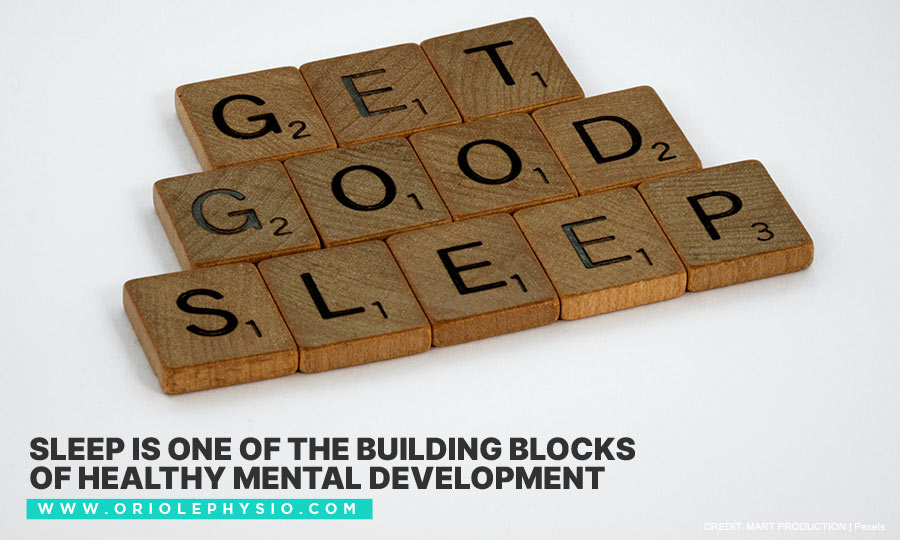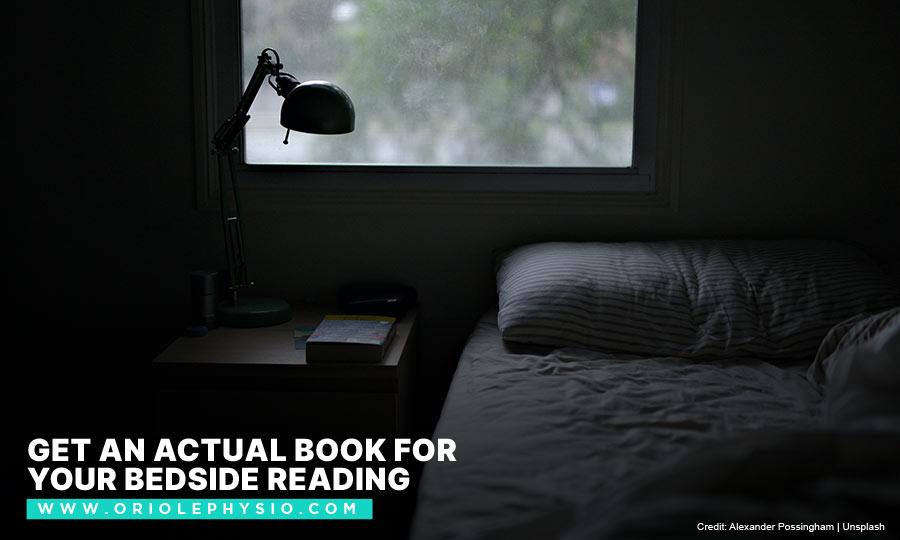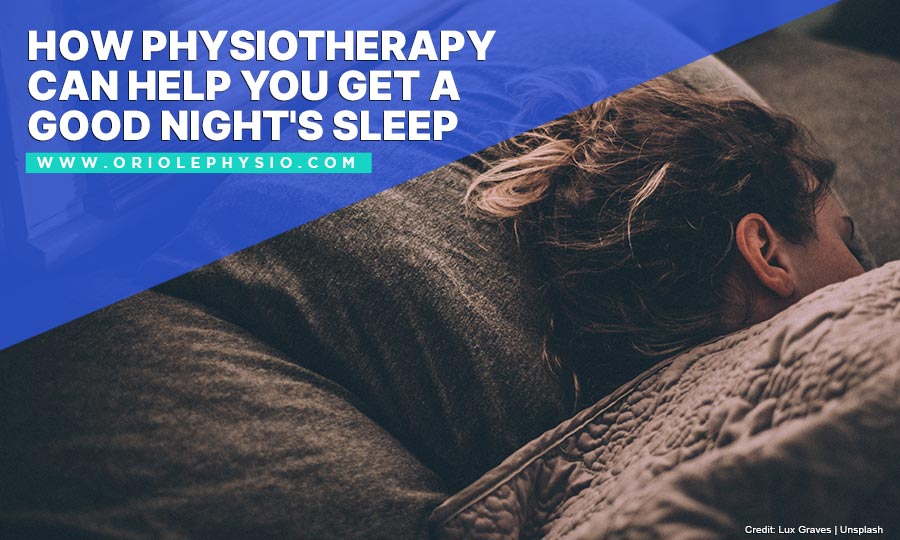How Physiotherapy Can Help You Get a Good Night’s Sleep
In this modern society, we often sacrifice adequate sleep to keep up with the demands of our busy lifestyles. We compromise a good night’s sleep for work, academic obligations, family responsibilities, or various social activities.
However, sleep deprivation can take a toll on both our professional and personal lives. In fact, a recent survey by the Canadian Sleep Review reveals that the work productivity of 60% of Canadians is negatively affected due to their lack of sleep.
Sleep deprivation has been known to cause health problems like a weakened immune system. It also puts us at risk of illnesses such as diabetes, obesity, and other conditions affecting the heart and blood vessels. While most of us are aware of the importance of good sleep, not all can improve their quality of sleep — this is where physiotherapy comes in.
Benefits of Quality Sleep
Before we get into the details as to how physiotherapy can improve your quality of sleep, let us delve first into the benefits of quality sleep.
- Better Learning and Memory

With a proper night’s sleep, your brain becomes sharper at learning new things and retaining memory. If you run on low sleep, chances are, you may find it difficult to take in information.
- Positive Mood
Do you often find yourself being cranky? If you are sleep-deprived, you will find yourself having a negative reaction to almost anything. Your emotions are affected because your brain was not able to process your emotions well due to lack of sleep.
- Happy and Healthy Heart
Your lack of quality slumber can affect your heart. Getting your fair share of much-needed rest guarantees a happy heart and healthy blood vessels. As you sleep, your blood pressure goes down and in the process, it also gives your cardiovascular system a good rest.
- Energy Booster

If you are into sports or if you have an active lifestyle in general, sleeping allows you to regain your energy and repair your muscles. It is especially true in the case of endurance sports such as running and swimming wherein it will require bursts of energy.
- Prevents Type 2 Diabetes
Constantly depriving yourself of sleep will result in insulin resistance. As a result, you will have high blood sugar rates and eventually, type 2 diabetes. During the deep part of your sleep cycle, the glucose in your blood drops. Extending your sleeping hours can also help improve the usage of insulin in your body.
- Strong Immune System
Did you notice that you get sick easily every time you sacrifice your sleeping schedule? It is because your lack of sleep has already affected how your immune system works against illnesses. If you keep on losing sleep, your immune cells will not work as fast and effectively as they would if you have a good night rest every night.
- Controlled Appetite and White

If you are well-rested, you can both control your appetite and your weight. Due to your lack of sleep, the hormones in your brain are affected, specifically the hormones that control your appetite, namely leptin and ghrelin. Once these hormones are out of balance, it increases both your appetite and, subsequently, your body weight.
How Physiotherapy Can Improve Sleep
Do you have insomnia or difficulty getting good sleep? Half of the population has the same condition as you.
There are many reasons why people have difficulties falling asleep. Among these reasons are pain and discomfort. Fortunately, there are also many ways to address these issues, and one of these is through physiotherapy.
While physiotherapists are more well-known to provide care for people who have illnesses related to movement and physical function, they can also provide assessments on your condition and recommendations on how to fall and stay asleep.
That said, read on some of the ways that can help you improve sleep through physiotherapy.
- Physiotherapy Can Help Identify the Cause
Upon your consultation with a physiotherapist, they can help you identify the underlying cause behind your lack of sleep. They base this on the details you provide about your lifestyle and your nutrition sources. They will also check on your health.
Should they find that you are suffering from sleep-related disorders, like sleep apnea, they can help you connect with experts in that field and coordinate with them should they recommend sleep apnea physiotherapy.
- Physiotherapy Can Prevent Soreness

Do you wake up feeling sore even if you slept physically fine? Do you wake up feeling restless even if you slept longer than usual? Physiotherapy can help out with that by determining and treating injuries that are causing you pain and soreness.
Depending on your condition, a physiotherapist will most likely recommend a stretching regime that you ought to do before sleeping. They can also help you analyze your sleeping positions and provide necessary adjustments to help you mitigate any precursors that lead to a bad night’s sleep.
- Physiotherapy Can Substitute Prescription Drugs for Your Pain Management
Most over-the-counter and prescription medicines can cause sleep disruption. If you are dependent on certain medications to manage your pain, physiotherapy can be a great alternative that replaces your dependency on these drugs.
Physiotherapists can develop a treatment plan that can encourage your body’s production of natural pain relievers while also treating the underlying causes.
- Physiotherapy Can Treat the Sleep Problems of Women

Women experience sleep-related problems more than men. One of the reasons is that sleep disruption can be attributed to the effects of pregnancy. Physiotherapy can somehow alleviate this burden through various techniques, such as the pillowing technique or the side sleeping position.
Apart from pregnancy, there are other factors that affect the quality of sleep among women. This includes menstrual cramping. Physiotherapy has been proven effective for treating dysmenorrhea.
- Physiotherapy Can Lead You to a Fit and Healthy Life
Physiotherapists would often prescribe an exercise regimen that you are required to do at home, at the gym, or physiotherapy clinic. Since physical activities will always go along with regular physical therapy, you will also live a healthy and fit life as a result. If you practice a habit of working out at least 3 or 4 hours before your intended bedtime, you will most likely have no problem falling asleep.
- Physiotherapy Can Provide Relaxation
These exercises your physiotherapist can provide you with peace of mind and free you of stress and anxiety. In the process, this gives your body the relaxation it needs. It will also increase your concentration power and improve your overall mood. Once you achieve all of these, expect that you will get much better sleep at night.
Tips to Fall and Stay Asleep
Suppose your problem of sleeping is due to body pain and discomfort. In that case, your physiotherapist will most likely advise you to carry out the following recommendations so you can find it easy to fall and remain asleep:
1. Have a healthy waking and bedtime schedule.
Keep a consistent wake-up time and bedtime schedule to regulate your body’s sleep and wake cycle. And as much as you want to sleep in or pull an all-nighter on the weekend, you still need to keep the same schedule. When it comes to maintaining a healthy sleeping pattern or cycle, consistency is always the key.
2. Set an activity to wind down.

It is ideal to set a winding down activity before you head for bed. You can listen to music, take a hot bath, or read a book. Most importantly, avoid scrolling through any electronic devices since the light coming from the screen can make it even harder for you to fall asleep.
3. Avoid short afternoon naps.
Afternoon or late evening naps can affect your sleep during the night, no matter how short they may be. In general, short naps of around 30 minutes cannot affect nighttime sleep quality. However, if you have insomnia, short naps won’t do you any good as these could further worsen your inability to sleep.
4. Make exercise a habit.
Daily exercise is among the best ways that promote a night of healthy and quality sleep. Even if you only have at least 20 to 30 minutes to spare in a day for exercise, make sure you work on the regimen as recommended by your physiotherapist.
5. Consider changing your sleeping environment.

Your sleeping environment can be a factor in why you have not had the best sleep recently or all these years. To make your room conducive for quality sleeping, make sure you get rid of or lessen any distractions such as light and noise. Your bed, beddings, and pillows can be a factor, too. Don’t be afraid to change things up in your sleeping area in your quest to get a good night’s sleep.
Consider Physical Therapy for Your Sleep Problems
Physiotherapy remains a good solution to sleeping woes brought by pain and discomfort.
For physiotherapy for insomnia and other sleep problems, book an appointment with Oriole Physiotherapy & Rehabilitation Centre. Email us at [email protected] to consult with any of our North York therapists.

